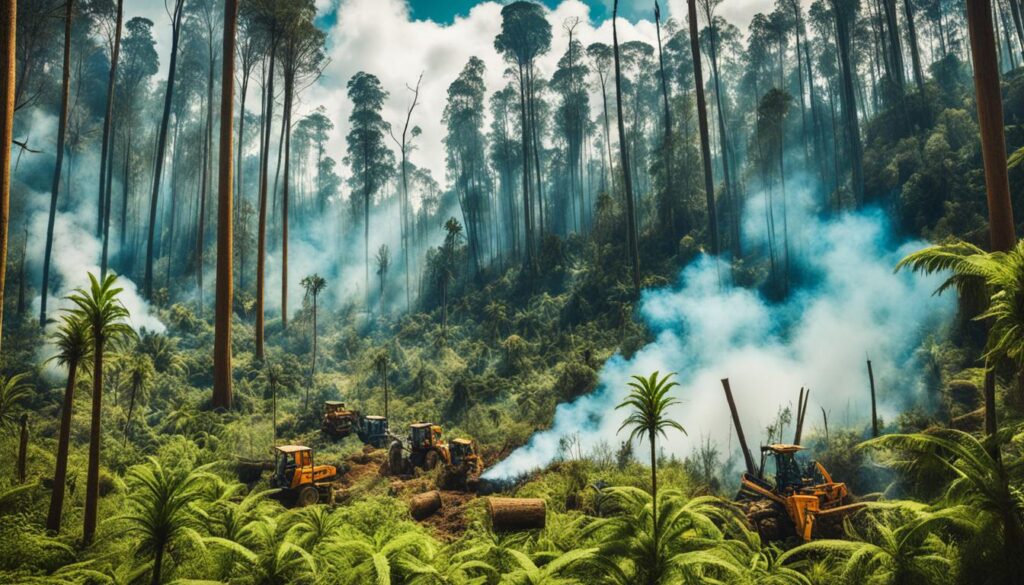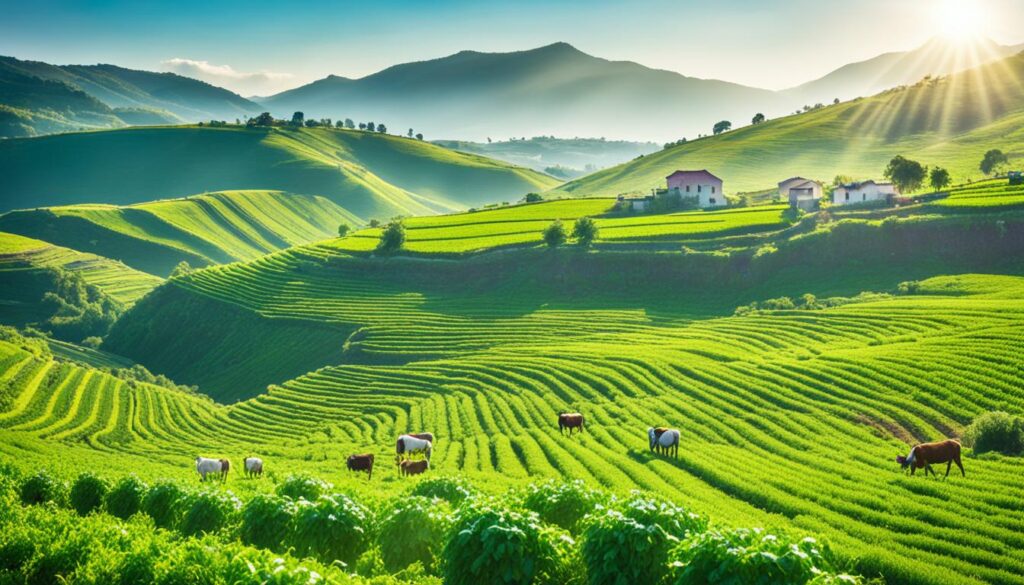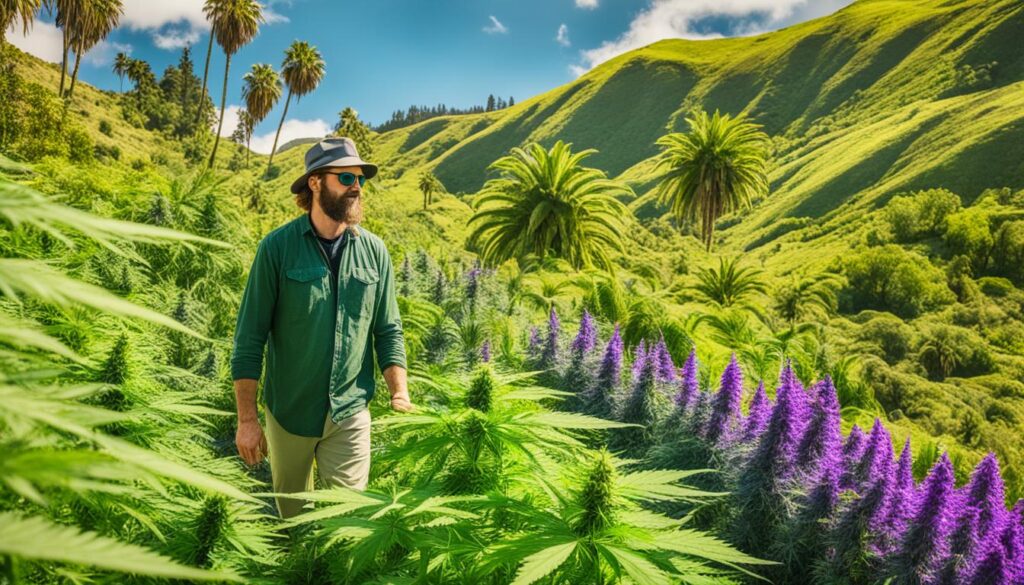Welcome to the world of weed in Madagascar! This island has a rich history and culture. It also has a deep connection with the plant, known as “zamal”.
Even though it’s illegal, many people in Madagascar use cannabis. In fact, it’s the 14th-highest in the world for cannabis use. The Malagasy people have used cannabis for centuries. They grow it with other crops to keep pests away and make the soil better.
On the island of Reunion, near Madagascar, they grow a special kind of cannabis called Zamal. This cannabis has been there for over 200 years. It has changed to fit the local weather and has become mostly Sativa.
There are many types of Zamal, like Zamal Mangu’ Carot, Zamal Kalité Poiw, and Zamal Fil Rouge. These names come from the Zamal heritage.
Key Takeaways weed in Madagascar
- Madagascar has the 14th-highest rate of cannabis consumption in the world, with 14.2% of adults using the substance.
- Cannabis, known locally as “zamal,” has been intertwined with Malagasy culture for centuries, often grown alongside other crops.
- The island of Reunion has been cultivating a distinctive landrace strain of cannabis called Zamal for over two centuries, resulting in unique Sativa-dominant characteristics.
- Different genetic lines of Zamal have emerged on Reunion Island, including Zamal Mangu’ Carot, Zamal Kalité Poiw, and Zamal Fil Rouge.
- The cannabis market offers Zamal strains in seed form, including 100% Sativa varieties and hybrids with reduced flowering times.
As you learn more about weed in Madagascar, you’ll see a mix of tradition and new ideas. There’s a big debate about making it legal. Let’s dive into the story of cannabis in this special place.
The Legal Status of weed in Madagascar
Cannabis has a long history in Madagascar. Archaeologists found evidence of it as far back as 300 CE. This shows it has been there for centuries.
The first records of cannabis use in Madagascar were in 1661. They talked about the Malagasy people mixing it with tobacco to smoke.
Historical and Cultural Significance of Cannabis in Madagascar
The Malagasy people used cannabis for spiritual and health reasons. They also used it a bit for fun at social events. But, Madagascar was quick to ban it in the 18th century.
Now, using or growing cannabis is illegal. You could get fined up to 10 million Ariary ($2,700) or jailed for two to five years. Selling or moving it can get you up to 20 years in prison and a 100 million Ariary ($27,000) fine.
Even though it’s illegal, many people in Madagascar use cannabis. It’s common in places like Mahajanga and Antsiranana in the north, and Tulear and Fianarantsoa in the south. Some use a plant called Huperzia obtusifolia instead of cannabis because it’s illegal.
Madagascar hasn’t started any programs for recreational or medical cannabis yet. But, its long history with the plant and its common use might change things in the future. As more countries legalize cannabis, we’ll see how Madagascar handles its laws on it.
Prevalence of Cannabis Use in Madagascar
Madagascar is an island in the Indian Ocean known for its plants and animals. It also has a lot of people who use cannabis. About 14.2% of adults there used it in the last year. This makes Madagascar the 14th highest in the world for using cannabis.
In Madagascar, people grow cannabis along with other crops. This helps keep pests away and makes the soil better. It’s good for farmers.
Madagascar uses a lot of cannabis, but let’s look at the world’s use too. In the U.S., 21.90% of people used cannabis in 2020. In Denmark and Italy, it was much less, at 6.30% and 10.20%.
Australia had 11.6% using cannabis in 2019. Canada had 27% of people over 16 using it in 2022. Papua New Guinea had a high rate of 29.5% in 1995.
Madagascar is one of the top countries in Africa for cannabis use. About 2.1 million people there use it. This makes it one of the top 10 in Africa.
As more people use cannabis around the world, we need to understand this trend. This will help make better laws about it.
“The prevalence rate of weed in Madagascar at 14.2% indicates a significant level of consumption compared to some countries with lower rates like Bulgaria at 2.40% in 2020.”
A 2021 United Nations report says drug use in Africa could go up by 40% by 2030. This shows we need a big plan to deal with cannabis use in Africa.
weed in Madagascar: Illegal Cultivation and Trafficking
In Madagascar, even though cannabis is illegal, many people still grow it. They do this to help their families survive. They hide their plants in the forests of the northern highlands in the Analabe region.
The government is trying to stop this by finding and destroying the plants. But, it’s hard because the problem is big and some places are hard to reach. People who grow cannabis know it’s risky, but they do it for the money.
Madagascar is also a key spot for moving drugs around the world. Criminals use its weak borders and laws to send drugs to other places. The government is fighting back with cannabis eradication programs. But, stopping the drug trade is hard.
To fix this, we need to do many things at once. We must use police, help farmers find other jobs, and work with the community. The government is working hard to stop illegal cannabis cultivation and drug trafficking in Madagascar.
Environmental Impacts of Cannabis Eradication
Deforestation and Ecological Damage
The environmental impact of cannabis eradication in Madagascar is worrying. Deforestation from cannabis eradication and ecological damage are big problems.
Using slash-and-burn methods to find cannabis farms causes a lot of deforestation in Madagascar. In the Tsaratanana Reserve and nearby COMATSA area, deforestation has gone up a lot. From 1996 to 2006, the reserve lost 0.1% of its forest each year. Then, it went up to 0.5% a year from 2006 to 2016. Now, it’s losing more than 1.3% a year.
This deforestation from cannabis eradication is very bad news. The Tsaratanana area got 2.4°C (4.3°F) warmer from 1985 to 2014. This ecological damage is hurting the unique plants and animals there, like the Rhombophryne frogs and Cophyla.
Trying to stop the illegal cannabis trade has hurt the environment too. In 2020, 13 people were arrested in the Tsaratanana Reserve. They destroyed marijuana fields and burned a lot of illegal cannabis. But, this also hurt the environmental impact of cannabis eradication in Madagascar.

As we think about legalizing and regulating cannabis, we must look at the environmental impact of cannabis eradication in places like Madagascar. We need to find a way to balance sustainable development with stopping the illegal drug trade. This is important to save Madagascar’s delicate ecosystem.
Prospects for Legalization and Regulation
Madagascar is at a crossroads with its views on cannabis. It’s not like its neighbors in South Africa and Zimbabwe, where cannabis might be legal soon. The island nation is not planning to legalize it for health or fun use.
Madagascar is against the drug. It’s working with Mauritius to stop illegal growing and drug trade. If you’re caught with or using cannabis, you could go to jail.
Many countries are making cannabis legal, like Canada and some U.S. states. But Madagascar is sticking with its strict rules. They don’t see the good in legalizing it for money and health reasons.
| Country | Cannabis Sales (in USD billions) | Legalization Status |
|---|---|---|
| Canada | N/A | Recreational use legalized in 2018 |
| Germany | $0.92 (2022) | Medicinal use legalized in 2017 |
| Israel | $3.4 (projected by 2027) | Medicinal use legalized in 1999 |
| Thailand | $2.3 (projected by 2027) | Decriminalized in 2022 |
Madagascar won’t make cannabis legal or regulate it. The cannabis legalization in Madagascar and marijuana regulation Madagascar are off the table. But, as more countries make it legal, Madagascar might change its mind. For now, it’s sticking with its strict rules on cannabis use and cultivation.
“The global trend towards cannabis legalization has been undeniable, with countries like Canada, Uruguay, and several U.S. states leading the way.”
The Debate: Addressing Poverty and Rural Development
In Madagascar, poor farmers face a tough choice. They grow cannabis illegally to make money since they have few other options. But, the government’s efforts to stop this have hurt the environment and didn’t solve the poverty problem.
Alternative Development Programs and Crop Substitution
Experts say the government should look into alternative programs and crop substitution. These could include new farming methods, helping farmers get to markets, and creating lasting jobs in the countryside.
| Alternative Crops | Potential Benefits |
|---|---|
| Vanilla | High-value cash crop, increasing global demand |
| Coffee | Established export market, potential for quality improvement |
| Cloves | Lucrative spice crop, favorable growing conditions in Madagascar |
By supporting these programs, the Malagasy government can help fight poverty and improve rural development. This approach also helps with the environmental issues from growing cannabis.

“The key to tackling the cannabis problem in Madagascar lies in empowering rural communities and providing them with viable economic alternatives to illicit crop cultivation.”
Risks and Considerations for Travelers
Travelers need to know about cannabis travel restrictions in Madagascar and the legal risks of cannabis in Madagascar. weed in Madagascar. This includes medicinal cannabis and products for personal use. Those caught using, selling, or possessing it face long prison terms and big fines.
There’s no legal difference in Madagascar between CBD, industrial hemp, and cannabis. This means possession, use, or sale of CBD products is also illegal. The article says to follow local laws and avoid the plant if you’re in or visiting Madagascar.
Madagascar is usually a safe place to visit, but be careful. The cyclone season from December to March can be dangerous, especially in the east. So, plan your trip with this in mind.
| Travel Budget | Daily Cost per Person |
|---|---|
| Budget Travel | £60/€80/US$90 |
| Mid-Range Travel | At least double the budget |
| Comfort-to-Luxury Travel | £200/€270/US$300 |
Know about the local money, the ariary, since Madagascar uses mostly cash. Credit cards aren’t widely accepted. Also, internet cafés and laundry are available, but be ready for power outages.
“The possession, use, or sale of CBD products is also against the law in Madagascar.”
In conclusion, Madagascar is a great place to visit, but know the legal risks of cannabis in Madagascar and traveling with cannabis in Madagascar. Following the laws ensures a safe and fun trip to this unique island.
Future Outlook and Policy Implications
The future of weed in Madagascar is hard to predict. The country is still fighting hard to get rid of the plant. But, there are growing worries about the effects on the environment and people’s lives. The government is not looking at other ways to handle it, like making it legal for medicine or fun.
Madagascar’s strict laws on cannabis have big effects. They could make the environment worse, slow down progress in rural areas, and affect how the country talks to other nations. As more countries change their cannabis laws, Madagascar’s leaders must think about the good and bad sides of changing their rules too.
Changing the rules on weed in Madagascarcould be big news. The government doesn’t want to make it legal, but people’s views and global pressure might make them think again. So, the future of cannabis in Madagascar is a tricky topic that needs a smart and detailed plan.
| Indicator | Madagascar (2024 est.) |
|---|---|
| Population | 29,452,714 |
| Gender Distribution | Male – 14,760,501; Female – 14,692,213 |
| Age Distribution | 0-14 years – 37%; 15-64 years – 59.1%; 65 years and over – 3.9% |
| Population Growth Rate | 2.18% |
| Birth Rate | 27.6 births/1,000 population |
| Death Rate | 5.8 deaths/1,000 population |
| Urban Population | 40.6% of total population |
The future of cannabis policy in Madagascar is still up in the air. But, the effects of their current laws are clear. As they face challenges, policymakers must think about the changes that could come.
Conclusion
In Madagascar, the story of cannabis is tied to history and culture. The government says no to cannabis, but people grow it anyway. This leads to environmental harm and problems for rural areas.
As the world changes, Madagascar might rethink its cannabis laws. It needs to find a way that helps the economy, fights crime, and protects nature. We need to think about the culture and life of the people there.
Finding a good way to deal with cannabis in Madagascar is key. It must respect the plant’s traditional use. At the same time, it must tackle crime, protect nature, and help rural areas. With the right plan, Madagascar could use cannabis in a way that helps everyone and keeps the environment safe.

As a veteran weed smoker for over 30 years and been very clean for the last 3 years, I have been craving it.
One thing I’ve never done is consume it?
I came across SunJet Plug and thought mmmm how esp with legalities etc.
So I made the plunge and purchased 12 brownies, well within 30 mins it kicked in and it was immense as I had a whole one from the off 😜
The rest did not last a week I was having 2 a day and my wife lost me for a few days I was in my own world apparently.
Kudos to the Sunjet plug love em, the taste is a bit undesirable could do with a tweak or two other than that no complaints
Contact him on his telegram link: t.me/sunjetplug
His email : sunjetplug@gmail.com
Many many thanks.😁
Take note ,he does not have telegram channels
Sunjet plug is 100% legit.. I’m a repeat customer.. I’ve ordered 10+ times now, and I’ve never had an issue.. Great product, great service.
Sunjet plug is extremely trust worthy , they never fail in what ever product I order, and its always in my hands with an hour of ordering 99% of the time….. its honestly rare when its more than 2 hours and that’s only because its the weekend when ive orded or a national holiday is on or something lol …. brilliant service I’m probably pushing maybe 2 months with them and I’ve never been disappointed ❤️ my only recommendation would maybe do a stamp card to get something free after 5 orders or a loyalty bonus of some kind ❤️
Email sunjet.. sunjetplug@gmail.com